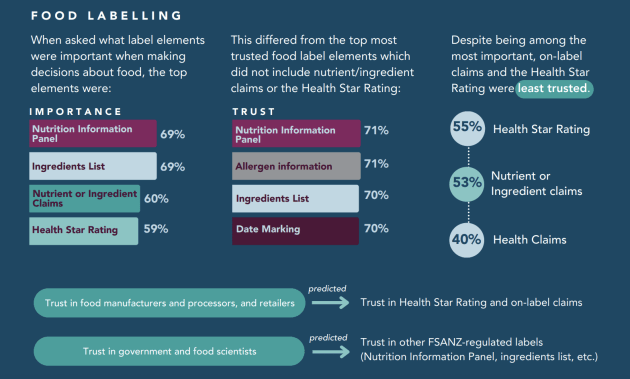A survey run by health authority, Food Standards Australia New Zealand (FSANZ), suggests that nutrition is the most valued food property for consumers, with 73 per cent of respondents stating they look for dietary information on labels. It also showed that over a third of consumers do not trust on-pack labelling.
FSANZ’s first Consumer Insights Tracker (CIT) surveyed over 2000 Australian and New Zealand consumers to establish their understanding of and trust in the food regulation system, and what they value when purchasing food products.
With 42 quantitative questions, the scope of the CIT included responses on consumers’ trust and confidence in the food supply and FSANZ, health and dietary behaviours, use of, understanding, and trust in food labelling, food safety knowledge and concerns, and new and emerging foods and food technologies.

The survey also gathered demographic data and included core questions that will be repeated annually for trend recognition, alongside point-in-time relevant questions on current food safety topics and issues.
FSANZ CEO, Dr Sandra Cuthbert, said that the agency is committed to building trust and confidence in the food supply and plans to run the CIT every year to track consumer attitudes to food safety over time.
“Public confidence in the food supply is critical to supporting good public health and economic outcomes in Australia and New Zealand while delivering broader social and cultural benefits,” said Cuthbert.
“FSANZ sets the standards for safe food and works with public health, government, academic and industry partners in both countries to keep the food supply safe, so it’s important for us to understand what consumers want and need from the bi-national food regulation system.
“The CIT will give FSANZ and our partners valuable insights into consumer attitudes, understanding and trust in food labelling and regulation to help inform our work and monitor changes over time,” she said.
2023 CIT Findings
The survey revealed that consumers were more likely to value nutrition over factors such as naturalness, convenience and country of origin, with three quarters of respondents stating that they look for nutrition information on food labels to help make good dietary choices.
Nutrition came only behind price in value choice, with a notable 65 per cent of respondents citing cost of living pressures as a key factor affecting their food choices.
With on-pack labelling being a hot topic at present, it was interesting to see the breakdown of opinions from consumers. The CIT revealed that 65 per cent of respondents trusted food labelling overall, however back-of-pack labelling information, like the Nutrition Information Panel and ingredients list, had a significantly higher rate of trust.
Around 70 per cent of respondents stated they trusted back-of-pack labelling, with a higher likelihood from people who trusted government and food scientists. People who trusted food manufacturers, processors and supermarkets were more likely to trust front-of-pack labelling information – including 40 per cent trusting health benefit claims, 53 percent trusting claims about nutrition and ingredient content, and 55 per cent trusting the Health Star Rating.
In terms of food safety, 72 per cent of respondents reported having confidence in the safety of the food supply, with a higher likelihood from those who trust the people involved in our food system, like farmers, supermarkets or government food authorities. Farmers had 83 per cent of respondents trust, government authorities had 63 per cent, and only 57 per cent of respondents trusted food manufacturers and processors.
For food safety, 59 per cent of respondents selected foodborne illness as the top food safety issue. Consumers generally reported high levels of engagement in food safety behaviours, but were more likely to engage in food safety behaviours concerning raw animal products than general hygiene behaviours.
The CIT revealed that respondents did not perceive eggs to be one of the riskiest foods, despite being one of the most common sources of foodborne illness, leading the FSANZ to speculate there may be a knowledge gap in areas of food safety.
For more information, the full 2023 CIT report is available on the FSANZ website.








